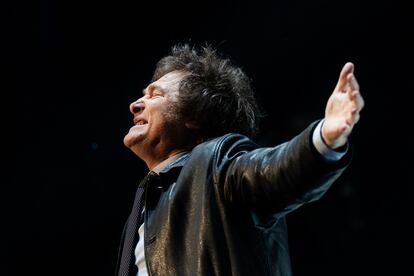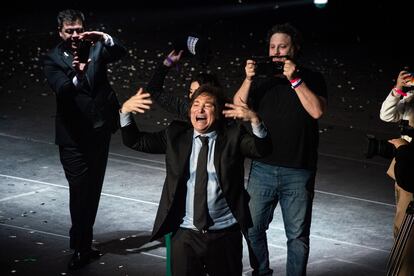Argentina to elect president amid the threat of the far-right
Javier Milei, a dictatorship denier who promises to dollarize the economy, leads the polls heading into Sunday’s first round vote, surpassing more moderate Peronist and conservative candidates


Argentina is heading for its most uncertain elections since the restoration of democracy, 40 years ago. The emergence of Javier Milei, a candidate who burst onto the political scene just over two years ago, has upset all the forecasts. His program advocates dollarization and the reduction of state power, he is a denier of climate change and Argentina’s military dictatorship, and he opposes legal abortion. Milei is currently leading the polls for the first presidential round that will be held on Sunday. He is up against the minister of economy, Sergio Massa, a Peronist candidate representing an increasingly distant version of Kirchnerism, the force that has prevailed in Argentine politics for two decades; and Patricia Bullrich, from Juntos por el Cambio (Together for Change), the alliance that brought Mauricio Macri to power in 2015. The former security minister of that flawed government is no longer considered the standard-bearer for change, with Milei snatching away the role.
The Argentine people are fed up with the recurrent economic crises and the unfulfilled promises made by a state that aspires to be a benefactor and loses resources day by day, asking for more while offering less and less. Milei’s voters have sprung from this hotbed, with an abundance of young people, especially young men, convinced that they will have a worse life than their parents have had. Followers of the ultra-conservative politician blame their frustrations on the state and its administrators — the politicians. This is where Milei has focused his campaign — using a very effective cocktail of simple phrases combined with a huge campaign on social media and rock and roll aesthetics. When a stadium begins to euphorically chant “the caste is afraid” or “dollarization, dollarization” adrenaline runs high and there is little room for any subtleties.
Milei’s incendiary rhetoric, with calls to “annihilate” the state with a chainsaw, has especially resonated among the lower middle and working classes. Milei’s enemies are the “scum” of Kirchnerism, but also the classical liberal right, which he accuses of being inept and lame. In August’s mandatory primary elections, Milei obtained seven million votes, 30% of the votes cast, and finished ahead of Juntos por el Cambio and the Peronists. If he were to repeat this result on Sunday, he would advance to the second round, which is scheduled for November 19. However, should he obtain 45% or reach 40% with a difference of 10 points over the runner-up, he would become president.
Milei’s challengers have little to offer. Sergio Massa, the man chosen by the ruling Peronism coalition, is struggling with the burden of economic governance, with catastrophic results. Year-on-year inflation is close to 140%, four out of 10 Argentines are in poverty and the Central Bank’s reserves are in the red. The economic disaster is of such magnitude that during the week leading up to the elections, many stores were forced to close due to the lack of reference prices for their products. A last-minute agreement with China granted the government some breathing space with the contribution of $6.5 billion of freely available funds, which will enable the economy to stay afloat at least until December 10, when the new government takes office.

Massa has campaigned by distancing himself as much as possible from the president, Alberto Fernandez, a figure who has plunged into political irrelevance, and from Cristina Kirchner, who has willingly sat out the election campaign. Notwithstanding all the challenges, Massa’s candidacy is still very much alive, and the polls even predict that he could pass to the second round. After all, he has the support of Peronism, a machine that, although on the decline, still preserves its firepower and a faithful voter base.
Meanwhile, Bullrich faces a tougher challenge. Her alliance, Juntos por el Cambio, did not foresee the Milei tsunami approaching and the second place obtained in the primaries has left her in a state of bewilderment. Argentines dissatisfied with Peronism in its Kirchnerist interpretation no longer believe that Macrismo is the promise of something new. Mauricio Macri left the government in 2019 with inflation at 50% and with more people in poverty than four years before. Bullrich, his successor, built her campaign around the concepts of security and order, without realizing that the severity of the economic crisis had changed voters’ priorities. It is against this backdrop of uncertainty that Milei emerged with his promises of dismantling everything to build from the rubble, although it is not clear what his ultimate plan is.
Argentina is at a turning point. The emergence of Milei evidences the crisis of a model of democracy that was based on the Peronism-anti-Peronism division. The far-right candidate is breaking the balance with attacks on both sides and positions himself on the outside of a dialectic relationship that, although conflictive, has been guaranteeing governability for 40 years. The only doubt that concerns the voters is whether the newcomer will be able to govern effectively, if he is elected president. Whatever the result, he will hold a minority in both the Chamber of Deputies and the Senate. On top of that, his party will not be represented by one of the 24 governors that control the Argentine territorial authority. On Monday, it will also be determined whether the Peronist Axel Kicillof manages to retain power in the province of Buenos Aires. The country’s largest electoral district does not foresee a second round and polls favor the Kirchnerist politician, even if only by a slight advantage.
However, the success has caught Milei off guard, and during the last month he has hurriedly sought to build bridges with the political and business world that distrusts him. He has surrounded himself with prominent politicians, many of them linked to the neoliberal Menemism of the 1990s, when Carlos Saúl Menem was president. Building ties is not the most characteristic feature of a candidate whose campaign slogan is that everything must be overturned.

Sign up for our weekly newsletter to get more English-language news coverage from EL PAÍS USA Edition
Tu suscripción se está usando en otro dispositivo
¿Quieres añadir otro usuario a tu suscripción?
Si continúas leyendo en este dispositivo, no se podrá leer en el otro.
FlechaTu suscripción se está usando en otro dispositivo y solo puedes acceder a EL PAÍS desde un dispositivo a la vez.
Si quieres compartir tu cuenta, cambia tu suscripción a la modalidad Premium, así podrás añadir otro usuario. Cada uno accederá con su propia cuenta de email, lo que os permitirá personalizar vuestra experiencia en EL PAÍS.
¿Tienes una suscripción de empresa? Accede aquí para contratar más cuentas.
En el caso de no saber quién está usando tu cuenta, te recomendamos cambiar tu contraseña aquí.
Si decides continuar compartiendo tu cuenta, este mensaje se mostrará en tu dispositivo y en el de la otra persona que está usando tu cuenta de forma indefinida, afectando a tu experiencia de lectura. Puedes consultar aquí los términos y condiciones de la suscripción digital.








































